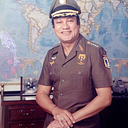General Noriega on Augusto Pinochet & the coup in Chile
The problem that ideologues had with Panama was that they couldn’t figure us out. We made friends based on our own value system. Chile was a good example. The Panamanian military had respectful relations with its Chilean military counterparts, but when General Augusto Pinochet seized power from Salvador Allende on September 11, 1973, we set out to provide asylum to as many people as we could. General Augusto Pinochet of Chile, who crushed dissent and murdered his opposition.
There was much concern in Panama upon hearing the news of the Chilean coup, since hundreds of our countrymen — students, leftists, even some opponents of the Panamanian military — were living there.
I called my counterpart as that country’s intelligence chief. General Augusto Lutz, knowing he had become a member of the new military junta, and used that contact to help rescue many Panamanians, Chileans and others. My friend briefed me on events, then put Pinochet on the line.
I recognized the general’s distinctive voice; he told me he had a daughter living in Panama and feared reprisals against her by leftist opponents. Without his asking I told him I would guarantee her security, which I did, although there were never any incidents.
In the days that followed, Pinochet’s military rounded up thousands of Allende supporters. Panama became a lifeline for people detained by Pinochet or threatened with arrest.
I asked our very able ambassador, Joaquin Meza, to go to the now infamous Santiago soccer stadium, where suspected leftists and opponents were later reported as having been tortured and killed. Panama managed to liberate at least 1,200 people — doctors, intellectuals, students — men, women and children.
In particular I remember the caseof a three-year-old girl named Macarena Franqui Marsh, whose father was a leftist activist. It was known that the father was in the hands of Chilean Military Police, the DINA, but the little girl was missing and believed held captive, it was said, perhaps to apply pressure on her father. Meza heard the story and used his diplomatic prowess, along with the goodwill I had with Pinochet, to rescue the little girl.
I was also able to help a United Nations official and members of the musical group Canta America, among others detained by the military regime.
Meza filled the Panamanian embassy in Santiago with refugees and when the building could hold not a soul more, Torrijos let us buy two additional buildings to hold more refugees under our diplomatic umbrella.
Years later, when I became commander of the Panamanian military, I went to Santiago for a hemispheric meeting of military chiefs. Pinochet invited me for a private dinner at his home with his wife and daughter. Ambassador Meza was also there.
Pinochet was in an ebullient mood. “Well, you Panamanians sure did save a lot of those Marxists — I’ll bet it was something like two thousand of them,” he said. “Tell me one thing, General Noriega. Have they ever thanked you?”
